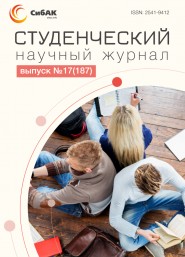Статья опубликована в рамках: Научного журнала «Студенческий» № 17(187)
Рубрика журнала: Социология
Скачать книгу(-и): скачать журнал часть 1, скачать журнал часть 2, скачать журнал часть 3, скачать журнал часть 4, скачать журнал часть 5, скачать журнал часть 6, скачать журнал часть 7, скачать журнал часть 8, скачать журнал часть 9
SOCIO-CULTURAL REHABILITATION OF YOUNG DISABLED PEOPLE IN RUSSIA
ABSTRACT
The article concentrates on the actual problem of socio-cultural rehabilitation of young disabled people, on the example of the Belgorod regional public organization "Blue Bird", which is an institution that helps families with children with autism spectrum disorders and young disabled people under 35 with other mental disorders.
Keywords: socio-cultural rehabilitation, young disabled people, problems of socialization, rehabilitation center.
Introduction. In the modern world, including our country, the number of people who need special care is growing every year. Although there is already a well-established set of measures to provide assistance, support and protection, however, innovative methods are required to provide socio-cultural rehabilitation of young disabled people in the Russian Federation.
In the modern post-industrial world, where the integration of interacting spheres takes place in all areas of society, young people with disabilities also strive to fully become members of a "large social family". To achieve these goals, special centers are designed to assist and support young people with disabilities in the Russian Federation in this process. These centers help this category of the population to pass, among other things, socio-cultural adaptation into society.
Special centers for the promotion of socio-cultural rehabilitation of young disabled people, provide all kinds of assistance in creating equal opportunities for normal and independent life of people with increased needs in our country.
The services of rehabilitation centers are involved in such important areas for young people with disabilities as: sports activities, educational services (inclusive education), the household component of rehabilitation, professional rehabilitation of young people with disabilities, and so on.
According to G.M. Gridasova, ensuring the normal functioning of the socio-cultural rehabilitation process will allow a young disabled person to integrate into the public institutions of the country, expand the scope in such areas as: sports activities, the institute of citizenship, art, professional aspect, political sphere, and in general will give a person the opportunity to realize their desires in accordance with their plans and ambitions [1].
Aslanova, G.N., Orlova M.V. consider socio-cultural activities as special events aimed at helping young people with disabilities develop and restore their creative abilities, professional retraining, restoration of self-service skills and abilities. The specificity of socio-cultural adaptation is that this direction of restoring the previous conditions of human life is an interdisciplinary element, as it is forced to interact with medical, pedagogical, professional, economic factors and so on [2].
We will analyze the organization of socio-cultural rehabilitation of young disabled people in the practice of social work on the example of the Belgorod regional public organization "Blue Bird", which is an institution that helps families with children with autism spectrum disorders and young disabled people under 35 with other mental disorders.
The study involved 15 respondents who are clients of BRPO "Blue Bird".
The most common source from which families with young people with disabilities learned about the organization of the Blue Bird BRPO is "told by relatives, neighbors, kith" (45%). Also, the options "suggested by social protection workers" and "suggested by health workers" with indicators of 30% and 25%, respectively, turned out to be significant indicators in terms of prevalence.
The majority of respondents (60%) were satisfied with the detailed description of the services of socio-cultural rehabilitation of young people with disabilities in the Blue Bird BRPO. However, for 30% of respondents, information about the services provided was insufficient. And 10% of the surveyed families who have a young disabled person found it difficult to answer.
The overwhelming number of respondents have a positive attitude to the conditions and services created on the basis of the Blue Bird BRPO, 30% of respondents were not satisfied with the organization's infrastructure, 10% found it difficult to answer.
The most popular services for young people with disabilities on the basis of the Blue Bird BROO were several directions at once: cultural and leisure, socio-pedagogical, socio-psychological with indicators of 26%. With the results of 11% there were two directions: social, social and legal.
90% were completely satisfied with the quality of the cultural and leisure services received. 10% of respondents were dissatisfied with the insufficiently developed network of informing potential customers about the nature and content of the proposed activities.
85% were completely satisfied with the improvement of the situation of a young disabled person after the socio-cultural rehabilitation carried out on the basis of the Blue Bird BRPO.
Conclusion. In general, the overwhelming number of families are completely satisfied with the quality of services received within the framework of socio-cultural rehabilitation on the basis of the Blue Bird BRPO.
Most families with young people with disabilities, as a rule, first turn to public institutions that can help in providing socio-cultural rehabilitation services.
The overwhelming number of respondents surveyed believe that after the socio-cultural rehabilitation of young disabled people, the client's condition has significantly improved.
Thus, we conclude that the need for such programs is extremely necessary, since such classes have a positive effect on the process of socio-cultural rehabilitation of young disabled people with autism spectrum disorder and other mental disorders.
References:
- Borisovsky, S.A. Socio-cultural rehabilitation as a technology of social work with young disabled people / S.A. Borisovsky // Collection. – 2017. – No. 4. – p. 76.
- Kantemirova, N.O. Directions of socio-cultural rehabilitation of young disabled people / N.O. Kantemirova // Research in the social sciences. Journal. – M: Grafa, 2016. – No. 2. – P. 15.


Оставить комментарий